Tuam babies whistleblower 'optimistic for closure'
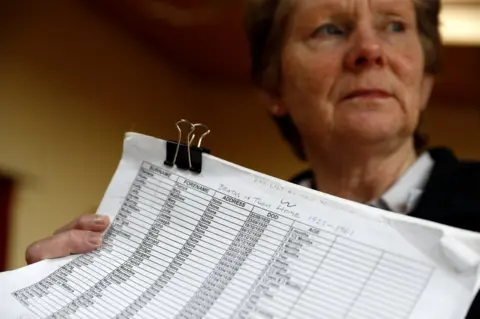 Reuters
ReutersThe amateur historian whose research helped uncover the Tuam babies scandal has said she is optimistic families affected will soon have closure.
Catherine Corless exposed the secret burials of hundreds of children at a former mother and baby home run by nuns in Tuam, County Galway.
A child died nearly every two weeks between the mid-1920s and 1960s.
Her comments come as the Irish government announce a director to oversee the site's excavation.
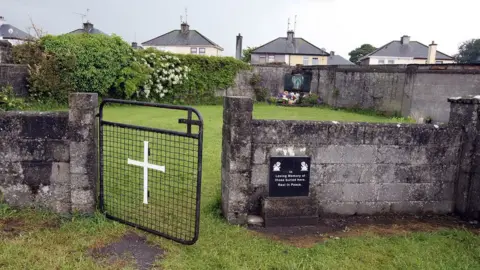 AFP/Getty Images
AFP/Getty Images"It is great news that finally a director has been appointed to oversee the excavation, exhumation, forensic DNA testing and dignified burial of the Tuam home babies who were discarded and lay in a sewage facility for many decades," Ms Corless told BBC News NI.
"This is what I have campaigned for over many years," said the historian who has been honoured for her "tireless" work.
"I am quite optimistic that the director, Daniel Mac Sweeney, who has vast expertise in this area, will do a thorough job, and bring closure for those who have siblings or relatives in that pit," she added.
Ms Corless spent years trying to find out what happened to the remains of hundreds of children who died at the Catholic-maintained home after she found there were death certificates for 796 infants, but no burial remains.
Fears of a mass grave were raised and her work made international headlines.
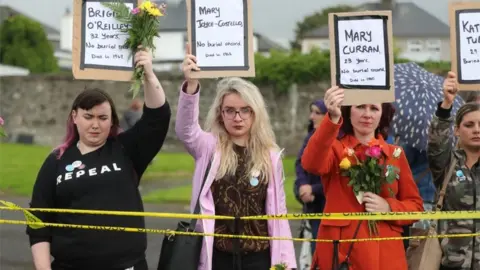 PA
PAMedia coverage of Ms Corless' findings in 2014 suggested the possibility that some of the children may have been buried in an underground sewage tank.
In October 2016 the Mother and Baby Homes Commission of Investigation began test excavations at the site in Tuam, later finding "significant quantities of human remains" in 17 underground chambers.
Tests confirmed that the bodies ranged in age from premature babies to children aged three.
At the time, then Taoiseach (Irish Prime Minister) Enda Kenny described the discovery as a "chamber of horrors", adding the babies had been treated like "some kind of sub-species".
Two years later, the commission confirmed the chambered structure containing the children's remains was in a disused sewage tank.
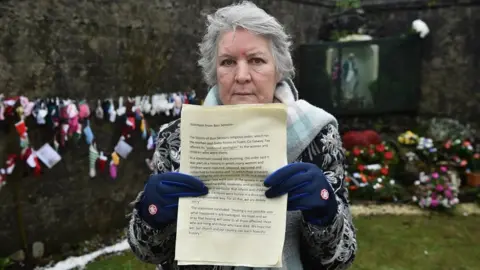 Charles McQuillan
Charles McQuillanLast February, the Irish government agreed draft legislation to excavate the site, however, a lack of clear deadlines was criticised by some families.
Annette McKay, whose sister Mary Margaret O'Connor died in the Tuam home, told the Irish Examiner in February she doubted any progress would be made this year.
Minister Roderic O'Gorman announced the appointment of Daniel Mac Sweeney as Director of Authorised Intervention on Tuesday.
Mr O'Gorman said that Mr Mac Sweeney will oversee "the long awaited intervention" and brings "extensive expertise and experience contributing to, leading and overseeing humanitarian programmes in the international arena", including in relation to missing persons and identification programmes involving the use of DNA.
Daniel Sweeney previously worked for the International Committee of the Red Cross (ICRC) from 2007 to earlier this year, most recently acting as an envoy on missing persons in the Caucasus region.
The Department of Children, Equality, Disability, Integration and Youth, which is overseeing the excavation, said Mr Mac Sweeney's key priority in the first instance will be to engage with relatives, survivors and former residents of Tuam.
"Work is ongoing to establish core staffing and administrative structures, and to appoint an advisory board to support Mr Mac Sweeney in his work," they added.
Minister O'Gorman also announced the appointment of former school principal and civil leader, Ms Sheila Nunan, to lead negotiation with religious bodies, on his behalf, in relation to contributions to the Mother and Baby Institutions Payment Scheme.
Dark, difficult, shameful
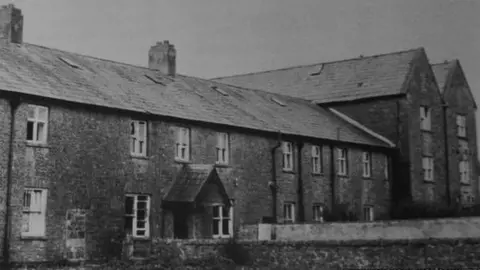 Tuam Home Graveyard Committee
Tuam Home Graveyard CommitteeEstablished in the 19th and 20th centuries, mother and baby homes housed women and girls who became pregnant outside marriage.
The children of these women were denied baptism and segregated from others at school. If they died at such facilities, they were also denied a Christian burial.
Hundreds of children died in the Tuam home over a 36-year-period.
Public outrage over Ms Corless' findings led the Irish government to set up a commission of investigation into mother and baby homes.
A 2021 report found that "an appalling level of infant mortality" existed in these institutions, prompting former Taoiseach Micheál Martin to issue a full apology on behalf of the state.
The Irish government said the report revealed the country had a "stifling, oppressive and brutally misogynistic culture".
Following the report's publication, Mr Martin said it described a "dark, difficult and shameful chapter" of Irish history.
There have also been calls for an inquiry into mother and baby homes in Northern Ireland.
